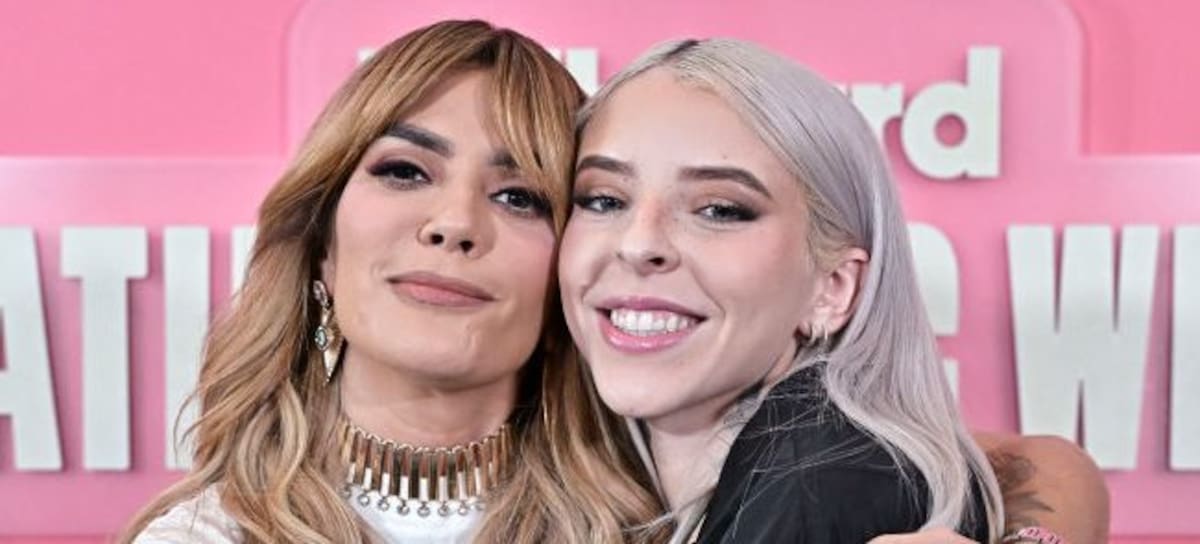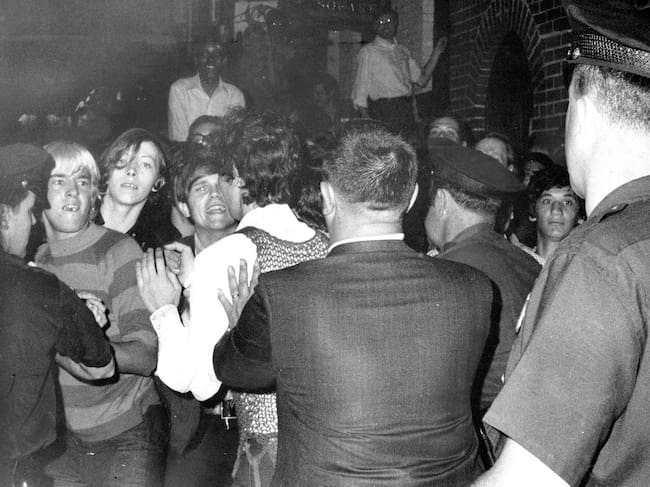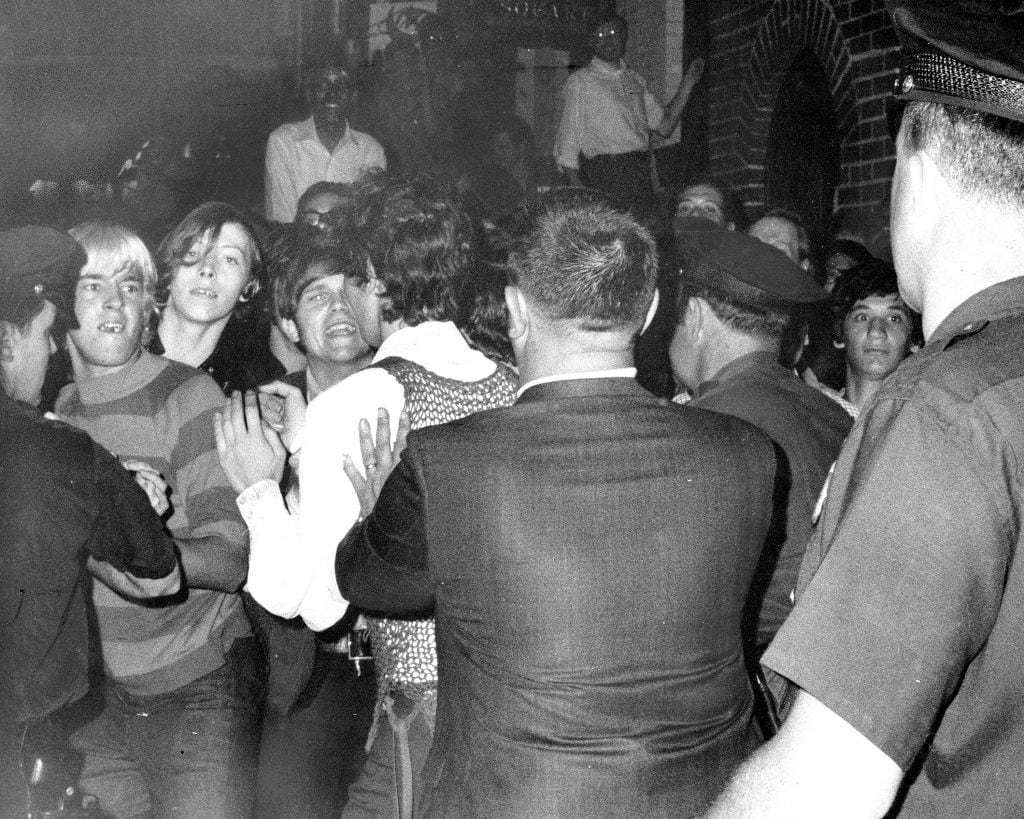Pride Month: History & Latin Artists Shaping LGBTQ+ Representation
Artists serve as a powerful voice for representation, empowerment, and even hope

Kany García and Young Miko in the green room at the Faena Forum as part of Billboard Latin Music Week on October 3, 2023 in Miami Beach, Florida. (Photo by Gustavo Caballero/Billboard via Getty Images)
As we know, June stands as Pride Month, a dedicated period to honor the LGBTQ+ community, champion equality, and amplify awareness about LGBTQ+ rights. But what’s the backstory behind Pride Month, you might ask?
Well, it all goes back to the Stonewall riots of June 1969 in New York City. Back then, LGBTQ+ spots faced frequent police raids, and discrimination against the community was widespread. However, on June 28, 1969, patrons of the Stonewall Inn, a popular LGBTQ+ bar in Greenwich Village, pushed back during a police raid, sparking days of protests and demonstrations. These events marked a pivotal moment in the LGBTQ+ rights movement, rallying the community to demand equal rights and protections.

Stonewall Inn nightclub raid. Crowd attempts to impede police arrests outside the Stonewall Inn on Christopher Street in Greenwich Village. (Daily News Archive via Getty Images) / New York Daily News Archive

Stonewall Inn nightclub raid. Crowd attempts to impede police arrests outside the Stonewall Inn on Christopher Street in Greenwich Village. (Daily News Archive via Getty Images) / New York Daily News Archive
In the aftermath of the Stonewall riots, LGBTQ+ activists and allies began organizing yearly events to honor the uprising and advocate for LGBTQ+ rights. These gatherings eventually evolved into what we now recognize as Pride Month—a time of celebration, visibility, and solidarity within the LGBTQ+ community.
Today, Pride Month is observed worldwide with parades, festivals, marches, and various events that promote its visibility and inclusivity. It serves as both a commemoration of past progress in the LGBTQ+ rights struggle and a spotlight on the ongoing challenges faced by the community.
Artists in the Community
Artists play a vital role in the LGBTQ+ community. They serve as a powerful voice for representation, empowerment, and even hope. Through their creative work, they contribute to the visibility and acceptance of LGBTQ+ individuals. Also, they help to break down stereotypes and foster understanding.
Whether through music, visual art, literature, or performance, artists express their truths, struggles, and triumphs, inspiring others to embrace their authentic selves. Moreover, LGBT artists often use their platform to raise awareness about LGBTQ+ rights and social justice issues.
As we celebrate Pride Month, let’s shine a light on some of today’s Latin music stars who have publicly embraced and supported their LGBTQ+ identity in recent years.
Young Miko
María Victoria Ramírez de Arellano Cardona, known as Young Miko in the artistic world, stands out not only for her musical talent but also for her unique style and openness about her sexuality. Despite being raised in a religious family, she has received unwavering support from them.
Despite her youth, she has become a prominent voice, advocating for LGBTQ+ visibility both within and beyond her community. In a campaign shared on her social media, she expressed, “When they say I look better when I keep quiet, it only makes me want to speak up even louder.”
Villano Antillano
Villano, 29-year-old urban artist from Puerto Rico, is making a significant impact in the music scene. She openly identifies as transgender, but her journey hasn’t been easy. She underwent her transition at 25, facing social and personal challenges along the way. “It took me a while because I tried hard to fit into society’s expectations, but it just wasn’t authentic,” she shared in an interview with Vogue.
Despite her success, Villano recognizes that there’s still much work to be done for queer artists in Latin music. “I’ve helped increase visibility for queer musicians, but true tolerance, respect, and equality are still lacking,” she explained in an interview with Billboard.
Kany García
Kany García de Jesús is a Puerto Rican-American singer-songwriter and musician. She first gained attention on TV back in 2004 as a contestant on the reality show ‘Objetivo Fama.’ Her talent has earned her five Latin Grammy Awards.
In 2016, she took to social media to share that she was in love with another woman. Talking about her authenticity, Kany told Billboard: “Real credibility doesn’t come from just songs or ideas, but from genuine authenticity. Having that credibility allows me the freedom to write about whatever I want, which is why I’ve been able to tackle topics that maybe I hadn’t explored before.”
Anitta
Anitta is recognized as one of the most genuine figures in the industry; she’s not afraid to be herself. The Brazilian has always been very honest about many aspects of her life. Such as her surgeries, love life, and sexual orientation.
I kissed a girl before kissing a boy,” she said during an interview with the Los Angeles Times. “I only told my mom […] I didn’t know how to feel. I thought something was wrong with me for wanting to kiss both a boy and a girl. But my mom just said, ‘So what?’”
Despite this, the singer has faced discrimination from society for her bisexuality and has been accused of pretending to be bisexual because she hasn’t had any known female partners. In response to this, she mentioned: “Some people say I’m ‘fake bi’ because I never had a long relationship with a woman,” she says. “But come on, even my relationships with guys don’t last more than three months.”
Pride Month isn’t just about revelry; it’s a call to action. It reminds us of the significance of standing against discrimination, advocating for equality, and supporting the rights of all individuals, irrespective of sexual orientation, gender identity, or expression.
